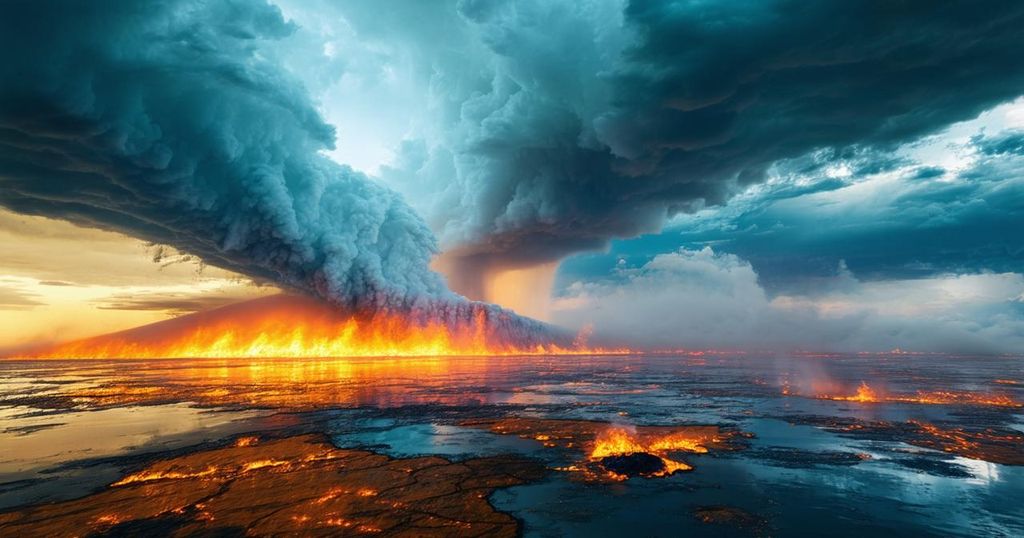UN Warns of Catastrophic Global Warming Trends Without Immediate Action

A UN report indicates that the world is on course for a temperature rise of 3.1 degrees Celsius this century unless substantial emissions cuts are implemented. It highlights that current commitments are inadequate to meet the 1.5 degrees Celsius target, with greenhouse gas emissions reaching an all-time high. Key figures call for immediate action to mobilize resources and bridge the emissions gap to prevent catastrophic climate outcomes.
The United Nations has issued a stark warning that the world is headed towards an alarming increase in temperatures by 3.1 degrees Celsius this century due to insufficient action on climate change. The UN Environment Programme (UNEP) released this caution in its annual report detailing the disparity between necessary emissions reductions needed to meet the 1.5 degrees Celsius target and current global commitments. Without unprecedented global action to mitigate emissions, this goal is at risk of becoming unattainable. The UNEP report noted that the current trajectory could see temperature increases ranging from 2.6C to 3.1C, contingent upon the fulfillment of countries’ climate commitments. As the upcoming UN COP29 conference in Baku approaches, there are calls for nations to enhance their climate financing and bridge the emissions gap. This comes in light of greenhouse gas emissions reaching a record high, with countries like those in the G20 contributing over 77% of total emissions. Prominent climate scientists emphasize that there is no safe threshold for climate change, and the 1.5 degrees Celsius limit is increasingly considered crucial to avoid severe weather events, ecological degradation, and rising sea levels. Yet, despite the existence of available technology to achieve the necessary emission reductions, global gas emissions continue to rise, reflecting a shortfall in effective action. UN Secretary-General António Guterres remarked that the international community is at a critical juncture, stating, “Either leaders bridge the emissions gap, or we plunge headlong into climate disaster – with the poorest and most vulnerable suffering the most.” He underlined the urgency for governments to transition from fossil fuel dependence to renewable energy and to adopt proactive measures against deforestation. Inger Andersen, the UNEP Executive Director, stated, “Climate crunch time is here. We need global mobilisation on a scale and pace never seen before – starting right now, before the next round of climate pledges… Even if the world overshoots 1.5C… we must keep striving for a net-zero, sustainable and prosperous world.” Nations are called to collectively commit to reducing greenhouse gas emissions by 42% by 2030 and 57% by 2035 in future climate plans. To achieve these goals, significant increases in renewable energy, energy efficiency, and conservation of natural habitats are necessary. In conclusion, the report serves as an urgent reminder of the immediate need for coordinated global action to address climate change effectively. It underscores the consequences of inaction and emphasizes the need for comprehensive plans that incorporate substantial emissions reductions.
The UN Environment Programme has been pivotal in assessing the global climate situation and guiding policy recommendations to combat climate change. With the Paris Agreement setting ambitious goals to keep global temperature rise well below 2 degrees Celsius and preferably to 1.5 degrees Celsius, continual updates and reports are essential to measure progress and motivate actions at national and international levels. The raised temperatures resulting from climate inaction could lead to dire environmental and societal outcomes, reiterating the importance of adherence to climate commitments and the urgency of collective effort among nations, particularly among the world’s largest emitters.
The warning from the United Nations elucidates the critical state of our planet concerning climate change, emphasizing that currently agreed actions are insufficient to avert severe temperature rises. It calls for immediate global mobilization to bridge the emissions gap, enhance financial resources for climate initiatives, and adopt aggressive emissions reduction strategies. As the world faces the impending COP29 conference, the importance of robust and actionable climate agreements cannot be understated.
Original Source: www.irishnews.com






